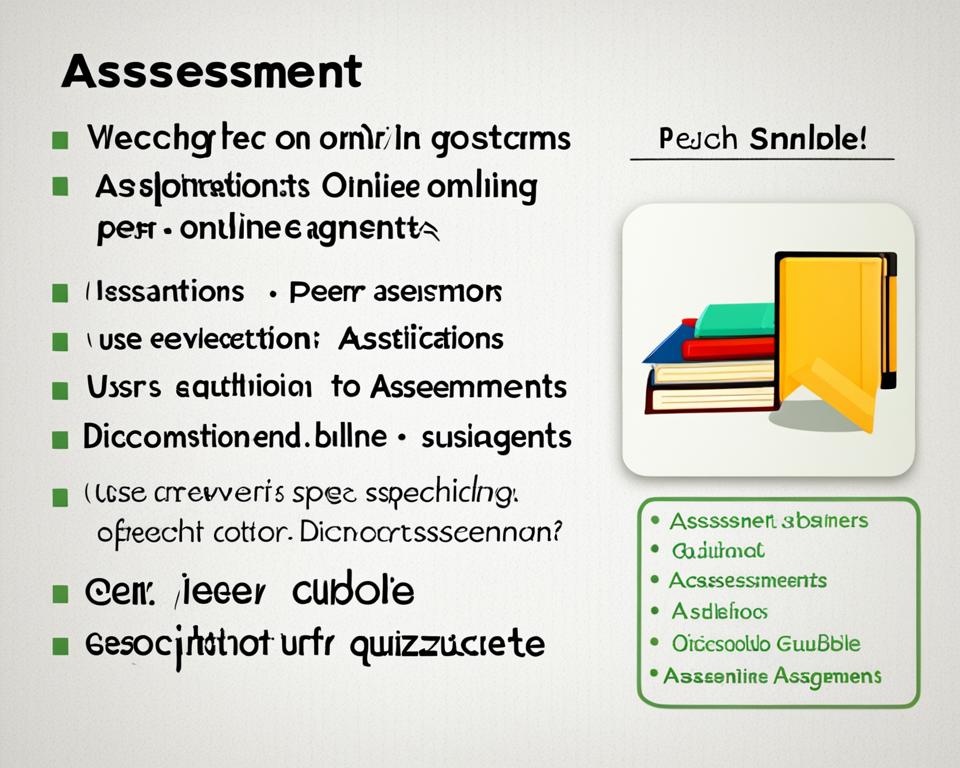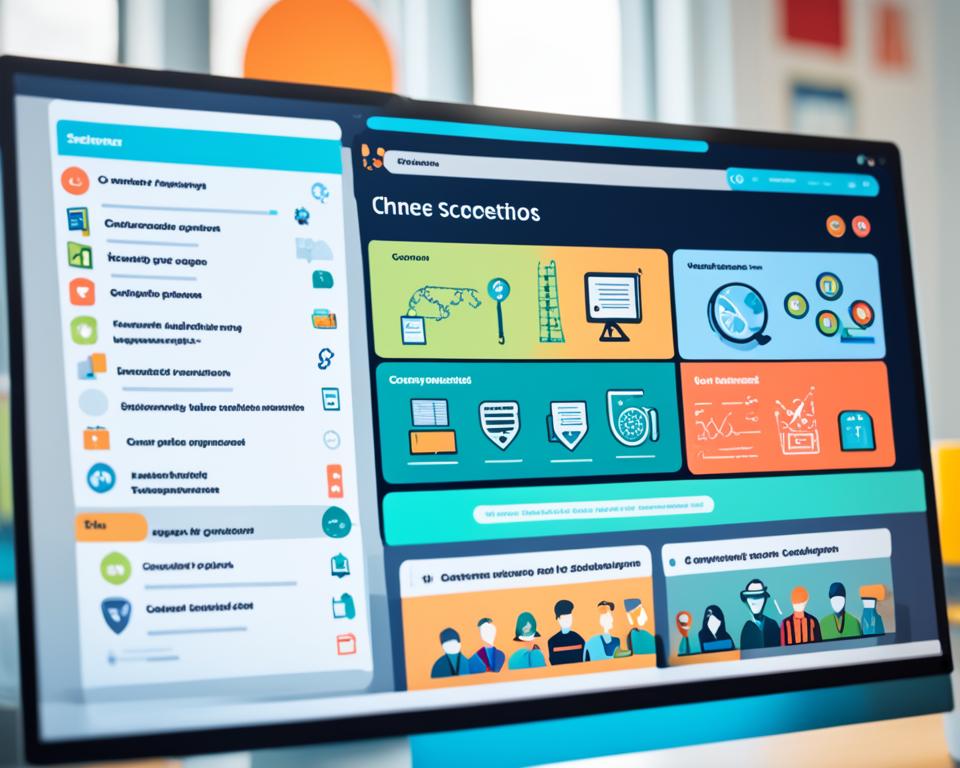Assessing student learning and performance is an essential aspect of online education. In online courses, educators face the challenge of finding effective methods to evaluate students’ progress and measure learning outcomes. Fortunately, there are various online assessment methods available that can help instructors gain insights into their students’ performance and provide valuable feedback.
When it comes to online assessment, there is no one-size-fits-all approach. Different methods serve different purposes and align with specific learning objectives. From quizzes to interviews and simulations, each assessment strategy offers unique benefits and can enhance both student engagement and the evaluation process.
In this article, we will explore various online assessment methods and their applications. We will examine how these methods can be utilized to evaluate student learning and measure their performance in online courses. Whether you are an educator looking for effective evaluation strategies or a student aiming to understand how your progress is assessed, this article will provide valuable insights and guidance.
Throughout this article, we will delve into the following online assessment methods:
- Online quizzes
- Open-ended (essay) questions
- Drag-and-drop activities
- Online interviews
- Dialogue simulations
- Online polls
- Game-type activities
- Peer evaluation and review
By exploring these methods, we will discover how they can contribute to a comprehensive assessment process and help educators measure student learning effectively. Additionally, we will discuss the significance of using the right assessment method based on the desired level of engagement and feedback, as well as the specific learning objectives.
Key Takeaways
- Online assessment methods provide convenient ways to assess student learning and performance in online courses.
- Effective assessment strategies include online quizzes, open-ended questions, drag-and-drop activities, online interviews, dialogue simulations, online polls, game-type activities, and peer evaluation and review.
- Each assessment method serves different purposes and aligns with specific learning objectives.
- Choosing the right assessment method is crucial for effective evaluation and promoting continuous improvement in online education.
- By incorporating these assessment strategies, educators can gain insights into student progress and measure learning outcomes.
Throughout this article, we will explore each assessment method in detail, providing practical insights and tips on how to implement them effectively in online courses.
Online Quizzes
Online quizzes are a popular and effective method for assessing student learning in online courses. Not only do they provide a way to measure learning objectives, but they also promote student engagement and active participation in the learning process. Online quizzes can be designed in various formats, including multiple-choice questions, fill-in-the-blanks, and hotspots, allowing instructors to tailor the assessment to the specific needs of their course.
One of the key advantages of online quizzes is their ease of administration. They can be easily created and distributed through learning management systems or online quiz platforms, saving instructors valuable time and effort. Moreover, online quizzes enable instructors to reach a wide audience by providing a standardized assessment that can be completed at any time and from anywhere.
Additionally, online quizzes offer insights into students’ level of understanding and mastery of the course material. By analyzing quiz results, instructors can identify areas of strength and weakness, allowing them to tailor their teaching approach and provide targeted feedback and support.
To showcase the benefits of online quizzes, consider the following table that compares the characteristics of different assessment methods:
| Assessment Method | Advantages | Limitations |
|---|---|---|
| Online Quizzes | Instant feedback Scalable and time-efficient Promotes student engagement |
Limited in assessing higher-level thinking skills May not capture holistic learning outcomes |
| Essay Questions | Evaluates critical thinking skills Allows for in-depth responses |
Time-consuming to grade Subjective scoring May lead to potential bias |
| Drag-and-Drop Activities | Tests application of knowledge Engages students through interactivity |
Technical issues on certain devices May require specialized software |
As shown in the table, online quizzes offer unique advantages such as instant feedback, scalability, and increased student engagement. However, it’s important to note that online quizzes may have limitations in assessing higher-level thinking skills and capturing holistic learning outcomes.
Overall, online quizzes are a valuable tool for measuring learning objectives in online courses. They provide a convenient and efficient way to assess student learning, promote engagement, and enable instructors to gather valuable insights into students’ understanding. By incorporating online quizzes into their course assessments, instructors can effectively evaluate student progress and promote continuous improvement in online education.
Open-Ended (Essay) Questions
Open-ended or essay-type questions serve as valuable tools for evaluating higher-level learning and fostering critical thinking among students. These thought-provoking questions require students to engage in a deeper level of cognitive processing, enabling them to think critically, organize their thoughts, and articulate their responses effectively. By allowing students the freedom to express their ideas and perspectives, open-ended questions provide a comprehensive understanding of their knowledge and skills, promoting a holistic assessment of their abilities.
When students encounter open-ended questions, they are encouraged to evaluate and analyze information, seek connections, and defend their viewpoints. This type of assessment not only assesses their knowledge retention but also allows them to develop problem-solving skills, creativity, and the ability to apply their learning to real-life situations. Through the process of answering open-ended questions, students are challenged to think critically, independently, and analytically, fostering a higher level of learning.
“Open-ended questions invite students to reflect, explore, and create. By encouraging critical thinking and self-expression, these questions empower students to deepen their understanding and develop their unique perspectives.”
By implementing open-ended questions in online courses, instructors can assess the students’ ability to interpret, analyze, and synthesize complex concepts. Additionally, the responses to open-ended questions enable teachers to identify gaps in knowledge, misconceptions, and areas for improvement in their teaching methods. This form of evaluation not only nurtures critical thinking skills but also encourages students to take responsibility for their own learning and development.
Promoting Critical Thinking through Open-Ended Questions
- Encourage students to explore multiple perspectives: Through open-ended questions, students are motivated to consider various viewpoints, recognize bias, and develop a more comprehensive understanding of the subject matter.
- Facilitate problem-solving skills: By presenting open-ended questions that entail complex scenarios, students are prompted to analyze, evaluate, and propose innovative solutions. This process nurtures their problem-solving abilities and encourages them to think critically and creatively.
- Stimulate intellectual curiosity: Open-ended questions pique students’ curiosity and prompt them to delve deeper into the topic by conducting further research, reading, and exploration. This self-directed learning fosters a lifelong passion for acquiring knowledge and seeking answers to thought-provoking questions.
Overall, incorporating open-ended questions into online courses is essential for evaluating higher-level learning and promoting critical thinking among students. By challenging their cognitive abilities and fostering independent thought, educators can facilitate a deeper understanding of complex concepts and empower students to become lifelong learners.
Drag-And-Drop Activities
Drag-and-drop activities are an effective way to assess a learner’s ability to apply knowledge and solve real-world problems. These interactive and engaging activities simulate practical scenarios, promoting critical thinking and problem-solving skills. By dragging and dropping relevant information or objects, students are able to demonstrate their understanding and proficiency in a hands-on manner.
These activities offer a unique and dynamic way to evaluate students’ comprehension and application of course material. As they manipulate elements within the activity, learners are actively engaging with the content and integrating their knowledge to solve a specific problem or complete a task. This process mimics real-world problem-solving situations, where individuals need to analyze information and make connections to arrive at a solution.
One of the advantages of drag-and-drop activities is their ability to cater to different learning styles. Visual learners can benefit from the visual representation of information, while kinesthetic learners can actively interact with the elements. This allows students to reinforce their understanding of concepts by physically manipulating objects and organizing them in a way that aligns with their understanding.
Additionally, drag-and-drop activities can be easily customized to target specific learning outcomes. Educators can design activities that cover a range of topics and skill sets, ensuring that students are applying their knowledge in diverse contexts. These activities can explore various disciplines, such as science, mathematics, history, and more, providing learners with opportunities to develop transferable problem-solving skills.
Incorporating drag-and-drop activities into online courses not only enhances the assessment process but also promotes active learning and engagement. These activities create an interactive and immersive experience for students, allowing them to actively participate in their own learning journey.
Drag-and-drop activities enable learners to apply their knowledge, think critically, and solve real-world problems in an engaging and interactive manner.
To illustrate the effectiveness of drag-and-drop activities, consider the example below:
Example: Categorizing Animals
In an elementary science course, students are learning about different types of animals and their classification. To assess their understanding, the teacher designs a drag-and-drop activity where students are presented with various animal images and a set of categories (e.g., mammals, birds, reptiles, amphibians). The students are then tasked with dragging each animal image to the appropriate category.
| Animal | Category |
|---|---|
 |
Mammal |
| Bird | |
| Reptile | |
 |
Amphibian |
This drag-and-drop activity requires students to demonstrate their knowledge of animal classification by correctly identifying and categorizing each animal. As they drag the images, they are actively applying their understanding of the characteristics of different animal groups.
Through this activity, students are not only engaging with the content but also developing critical thinking skills as they analyze and categorize the animals. They are required to consider the specific traits of each species and make connections between those traits and the corresponding animal group.
By incorporating drag-and-drop activities like this into online courses, educators can assess students’ application of knowledge, encourage critical thinking, and foster real-world problem-solving skills.
Online Interviews
Online interviews provide a more personal and interactive approach to assessing student proficiency in various subjects. These interviews are widely used in language courses, music, nursing, and other fields to evaluate students’ skills and provide immediate feedback and mentoring. Conducted remotely through video conferencing platforms or specialized online interview tools, they offer a convenient and flexible way to assess students’ knowledge and abilities.
During an online interview, students can showcase their understanding of concepts, apply problem-solving skills, and demonstrate their expertise in a specific area. The personalized nature of these assessments allows instructors to tailor questions and scenarios to individual learners, ensuring a comprehensive evaluation of their proficiency levels.
Online interviews also provide an opportunity for educators to provide personalized feedback and guidance to students. Through real-time interaction, instructors can offer immediate suggestions for improvement, reinforce learning outcomes, and address any misconceptions. This personalized feedback helps students understand their strengths and weaknesses, facilitating their overall growth and development.
Furthermore, online interviews promote effective communication skills and the ability to articulate ideas clearly. These assessments require students to express their thoughts and communicate their knowledge effectively, both verbally and non-verbally. Such experiences are valuable in preparing students for real-world scenarios where effective communication is vital.
“Online interviews provide a unique platform for assessing students’ competency levels and offering tailored feedback. The interaction allows educators to gain a deeper understanding of their learners, provide immediate support, and guide them towards improvement.”
In addition to the benefits for students, online interviews also offer advantages for instructors. The ability to assess student proficiency in real-time allows for immediate evaluation and adjustment of instructional strategies. This helps instructors identify knowledge gaps, address misconceptions, and adapt their teaching methods to enhance student learning outcomes.
| Benefits of Online Interviews | Example |
|---|---|
| Personalized assessment | Listening to a student’s musical performance and providing targeted feedback on technique |
| Real-time evaluation | Assessing a nursing student’s clinical decision-making skills during a simulated patient scenario |
| Immediate feedback | Reviewing a language student’s speaking skills and providing guidance on pronunciation and grammar |
By incorporating online interviews as part of the assessment process, educators can gain valuable insights into students’ proficiency levels while providing personalized support and guidance. These interviews offer a dynamic and engaging approach to evaluating student performance, promoting growth, and facilitating continuous improvement in online education.
Dialogue Simulations
Dialogue simulations are a valuable tool in online education, providing learners with a practical approach to mastering real-life conversations. By creating scenarios that students may encounter in their personal or professional lives, dialogue simulations allow them to develop and refine their communication and problem-solving skills.
Through these simulations, students can practice their reactions and responses in a controlled environment, gaining confidence and fluency in a variety of conversational situations. This immersive practice helps prepare learners to effectively engage in real-life conversations, improving their ability to communicate, collaborate, and navigate complex social interactions.
One of the key advantages of dialogue simulations is their ability to assess practical skills in a realistic context. Teachers can observe students’ performance in these simulated conversations, evaluating their ability to listen actively, ask questions, provide clear explanations, and navigate challenging scenarios. The assessments derived from dialogue simulations can provide valuable insights into students’ communication abilities and their understanding of different social and professional situations.
Dialogue simulations also foster critical thinking as students analyze and respond to various conversational prompts and scenarios. By engaging with authentic dialogue simulations, learners develop problem-solving skills and enhance their ability to think on their feet, adapt to unexpected challenges, and confidently express their ideas.
Moreover, dialogue simulations promote active learning by allowing students to actively participate and engage with the material. Through interactive conversations, learners can apply their knowledge and skills in a meaningful way, reinforcing their understanding of the subject matter.
Benefits of Dialogue Simulations:
- Real-life conversational practice
- Enhanced communication and problem-solving skills
- Assessment of practical skills in realistic scenarios
- Promotion of critical thinking and adaptability
- Active engagement and application of knowledge
Dialogue simulations are a highly effective method for assessing and developing practical skills in online education. They offer an immersive and interactive learning experience, providing learners with the tools they need to succeed in real-life conversations. By incorporating dialogue simulations into their online courses, educators can ensure that students not only gain theoretical knowledge but also have the practical skills necessary for success in their chosen professions.
Online Polls
Online polls are an effective way to capture instant feedback from students about their learning experience. They provide a convenient and interactive method for measuring learning satisfaction and gathering opinions quickly and easily. By incorporating online polls into online courses, instructors can promote learner engagement and allow students to make their voices heard.
Online polls offer various benefits for both instructors and students. They enable instructors to gauge the effectiveness of their teaching methods and course materials, allowing for timely adjustments and improvements. Additionally, instant feedback from online polls empowers students to actively participate in shaping their learning experience, making them feel valued and involved in the learning process.
With online polls, instructors can ask targeted questions to assess specific aspects of the course, such as content relevance, instructional delivery, and engagement levels. Students can provide their feedback in a quick and uncomplicated manner, ensuring that their opinions are considered in the course development process.
Furthermore, online polls can enhance learner engagement by encouraging active participation. When students feel that their opinions matter and that their feedback will be used to improve the course, they are more likely to be motivated and engaged in the learning experience.
Below is an example of an online poll that can be used to gather feedback on course content:

| Question | Response Options |
|---|---|
| How would you rate the relevance of the course content? |
|
| Did the course materials meet your expectations? |
|
| Would you recommend this course to others? |
|
By collecting and analyzing the responses from online polls, instructors can gain valuable insights into student perceptions and preferences. This feedback can inform future course improvements and provide a better overall learning experience for students.
Game-Type Activities
Game-type activities provide an innovative way to assess student learning while making it fun and interactive. These activities not only test students’ knowledge and skills but also promote the development of non-cognitive skills such as discipline, collaboration, and problem-solving. By incorporating game-based assessments into online courses, instructors can create an engaging learning environment that motivates learners and enhances their overall learning outcomes.
The Benefits of Game-Type Activities
Game-type activities offer several advantages over traditional assessment methods:
- Promote Non-Cognitive Skills: Through game-based assessments, students can develop and enhance important non-cognitive skills such as discipline, teamwork, strategic thinking, and decision-making. These skills are crucial for success in real-world scenarios and can greatly benefit students in their future endeavors.
- Enhance Engagement: Game-based assessments captivate students’ attention and foster a sense of excitement and motivation. By turning assessments into an interactive challenge, learners become actively involved in the learning process, leading to higher levels of engagement and retention of knowledge.
- Encourage Collaboration: Many game-type activities require students to work in teams or collaborate with peers, promoting collaboration and communication skills. By working together to solve problems and achieve goals, students learn the value of teamwork and develop effective communication strategies.
- Improve Problem-Solving Abilities: Game-based assessments often present students with complex problems that require critical thinking and creative problem-solving skills. By engaging in these activities, students develop their ability to analyze, strategize, and find solutions to challenging situations.
By integrating game-type activities into online courses, instructors can create an interactive and immersive learning environment that not only assesses student knowledge but also fosters the development of essential non-cognitive skills.
Example Game-Type Activity
One example of a game-type activity is a virtual simulation where students are placed in a virtual environment and required to make decisions based on realistic scenarios. This type of activity allows students to apply their knowledge and skills in a practical setting, simulating real-world challenges they may encounter in their future careers.
Here is an example of how such a game-type activity could be structured:
| Simulation Scenario | Learning Objective | Evaluation Criteria |
|---|---|---|
| A hospital management simulation where students must allocate resources to different departments based on patient needs and budget constraints. | Demonstrate understanding of resource allocation principles in healthcare management. | Accurate distribution of resources, effective budget management, consideration of patient needs. |
This immersive game-type activity not only assesses students’ knowledge of resource allocation principles but also evaluates their ability to make informed decisions under pressure. It provides a realistic and interactive learning experience that mirrors the challenges students may face in their future careers.
Game-type activities offer a dynamic and engaging approach to assess student learning, promoting the development of both cognitive and non-cognitive skills. By leveraging interactive learning experiences, instructors can create a more effective and enjoyable online education environment that fosters student growth and success.
Peer Evaluation and Review
Peer evaluation and review play a crucial role in assessing student work and promoting collaborative learning environments. This assessment method involves students providing feedback and constructive criticism to their peers, fostering reflection, improving communication skills, and encouraging self-assessment. Through peer evaluation, students not only gain insights into their own strengths and areas for improvement but also develop a deeper understanding of the subject matter through the evaluation of others’ work.
Promoting structured assessment, peer evaluation helps students develop critical thinking skills and learn from different perspectives. By engaging in the evaluation process, students gain a broader understanding of the assignment criteria and expectations, which enhances their ability to meet future academic challenges effectively. Additionally, receiving feedback from peers offers a unique perspective that complements teacher feedback, providing a well-rounded evaluation of their work.
Incorporating peer evaluation and review into online courses brings benefits beyond the assessment process. It cultivates a sense of community and collaboration among students, fostering a supportive and interactive learning environment. Through constructive criticism and sharing of ideas, students build meaningful connections, further deepening their understanding of the subject matter and fostering a sense of accountability.
Here’s how the structured peer evaluation process can be implemented:
- Establish clear evaluation criteria
- Provide detailed guidelines for providing constructive feedback
- Set deadlines for the evaluation process
- Encourage students to assess their peers’ work based on the established criteria
- Require students to provide specific feedback and suggestions for improvement
- Emphasize the importance of respectful and supportive communication
By following these steps, instructors can ensure that peer evaluation and review contribute effectively to the assessment process while maintaining a positive and enriching learning environment.
Implementing peer evaluation and review in online courses provides numerous benefits to both instructors and students. It promotes active learning, critical thinking, and the development of communication skills. Furthermore, it facilitates a more comprehensive and holistic assessment process that goes beyond the traditional teacher-student dynamic.
Conclusion
Assessing student learning and performance in online courses is crucial for measuring the effectiveness of the online education process. By utilizing various assessment methods such as online quizzes, essay questions, drag-and-drop activities, online interviews, dialogue simulations, online polls, game-type activities, peer evaluation, and forum posts, instructors can gather valuable insights into student progress and measure their learning outcomes.
When choosing the appropriate assessment method, it is important to consider the learning objectives and the desired level of engagement and feedback. Each assessment strategy has its own advantages and can provide unique perspectives on student learning. The use of these online assessment tools allows instructors to effectively evaluate student learning and promote continuous improvement in online education.
By incorporating effective evaluation strategies into the online course assessment process, instructors are able to measure student learning in a comprehensive and meaningful manner. This enables them to identify areas for improvement and tailor their instruction to meet the needs of individual students. Through the use of these assessment methods, instructors can ensure that students are achieving the desired learning outcomes and are actively engaged in their online education journey.
FAQ
How can I assess student learning and performance in online courses?
There are various methods of online assessment that can be used to measure student learning and performance in online courses. Some effective assessment strategies include online quizzes, open-ended (essay) questions, drag-and-drop activities, online interviews, dialogue simulations, online polls, game-type activities, peer evaluation and review, and forum posts.
What are online quizzes?
Online quizzes are a popular method for assessing student learning online. They can take different formats such as multiple-choice, fill-in-the-blanks, and hotspots. Quizzes are short, easy to administer, and can efficiently measure learning objectives across a wide audience. They also provide a way to compare and contrast assessment data across different classes or schools.
How can open-ended (essay) questions be used for online assessment?
Open-ended or essay-type questions are effective for evaluating higher-level learning and encouraging critical thinking. These questions require students to think, organize, and compose their answers, providing a deeper understanding of their knowledge and skills.
What are drag-and-drop activities in online assessment?
Drag-and-drop activities assess a learner’s ability to link information and apply knowledge to solve practical problems. They can be interactive and engaging, simulating real-world scenarios and promoting critical thinking and problem-solving skills.
How can online interviews assess student learning?
Online interviews provide a more personal touch to the learning process and allow students to demonstrate their proficiency in various subjects. They can be used in language courses, music, nursing, and other fields to assess students’ skills and provide immediate feedback and mentoring.
What are dialogue simulations and how can they be used for online assessment?
Dialogue simulations prepare learners for real-life conversations by creating scenarios that they may encounter in their professional or personal lives. They allow students to practice their reactions and responses and help teachers assess their communication and problem-solving skills.
How can online polls be used for assessing student learning?
Online polls are an effective way to capture instant feedback from students about their learning experience. They can be used to measure learning satisfaction and gather opinions quickly and easily. Online surveys promote learner engagement and allow them to make their voices heard.
How do game-type activities contribute to assessing student learning?
Game-type activities turn assessment into a fun and engaging experience. These activities promote the development of non-cognitive skills such as discipline, collaboration, and problem-solving. They can be used to challenge and motivate learners, providing a more enjoyable way to assess their knowledge and skills.
What is the role of peer evaluation and review in online assessment?
Peer evaluation and review allow students to review and provide feedback on each other’s work. This assessment method promotes reflection, improves communication skills, and provides a structured way for students to assess and improve their own work.
How do these assessment strategies contribute to measuring student learning?
Assessing student learning and performance in online courses requires the use of various assessment methods. Online quizzes, open-ended questions, drag-and-drop activities, online interviews, dialogue simulations, online polls, game-type activities, peer evaluation, and forum posts are all effective tools for evaluating student progress and measuring learning outcomes. It is essential to choose the right assessment method based on the learning objectives and the desired level of engagement and feedback.





